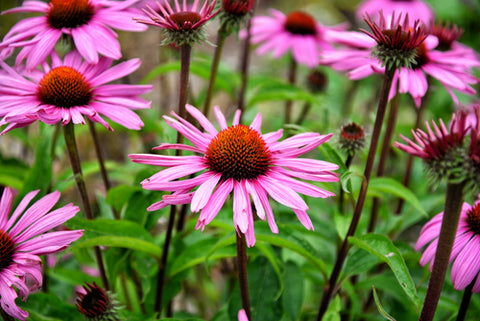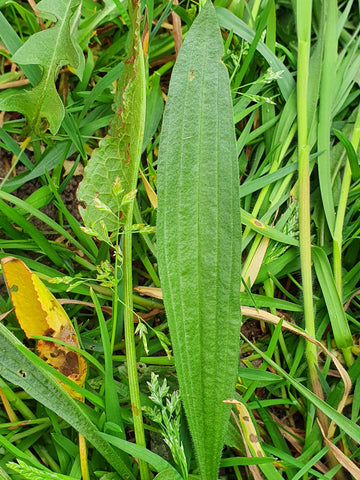Which herbs can you give to horses with sweet itch?
The Natural Way - specialized in itching and skin complaints and the natural treatment of horses with sweet itch, mud fever and CPL.
Herbs are an ideal variation in the ration and have been the staple food of horses for centuries. But did you also know that you can give herbs to support itching and skin complaints?
Based on her many years of passion as a herbalist, Laura Cleirens from The Natural Way provides an overview of edible plants that you can pick - safely and in moderation - , their effect and application and additional tips.
Introduction
- How many herbs can a horse eat daily?
- Overview of safe and edible plants for horses
- Stinging nettle (Urtica dioica)
- Marigold (Calendula officinalis)
- Dandelion (Taraxacum officinale)
- Cleaver (Galium aparine)
- Chickweed (Stellaria media)
- Daisy (Bellis perennis)
- Purple coneflower (Echinacea purpurea)
- Real chamomile (Matricaria chamomilla)
- Rosehip (Rosa rugosa)
- Yarrow (Achillea millefolium)
- Milk thistle (Silybum marianum)
- Narrow plantain (Plantago lanceolata)
- Greater plantain (Plantago major)
- Birch (Betula)
- Great burdock/Great burdock (Arctium lappa)
- Shepherd's purse (Capsella bursa pastoris
- Final word
How many herbs can a horse eat daily?
All the herbs in this article are safe and suitable for feeding your horse as a variation, both to support complaints and to keep your horse in good health. Select a few herbs, pick them fresh in a clean environment and feed 1 handful per day (50-100g), dry them in the winter months or buy them dried and stick to the recommended amount stated on the packaging.
Never give herbs all year round, but vary and use them according to the treatment principle. A good regimen consists, for example, of 3 weeks of herbs and 1 week off.
Overview of safe and edible plants for horses
Stinging nettle (Urtica dioica)

Nettles are a fantastic but underrated plant for use in horses. You can cut these off at the edge of your pasture and let them dry on the pasture for a few hours. As soon as the injection is removed, your horse will eat it automatically. An ideal and healthy snack for a change! You can also dry these so that you have a winter supply.
This plant has a blood and lymph purifying, deacidifying and detoxifying effect. It boosts your horse's immunity/resistance, so be sure to pick the fresh buds in the spring.
Nettles are an ideal addition to the ration if your horse suffers from sweet itch, mud fever and other complaints. They are good for the skin, urinary tract, digestion, allergies, rheumatic and joint complaints and support general well-being.
Nettles are a source of vitamins: A, B, C, D, E and K, tannins, formic acid, flavanoids, minerals: calcium, potassium, sodium, iron, silicon and bitter substances, histamine, acetylcholine and more.
Marigold (Calendula officinalis)

Marigold, known from Calendula or Marigold Ointment, occurs in the wild as a smaller variant, and is also cultivated for its medicinal purposes.
Marigold can be used in horses to support sweet itch, thanks to its beneficial effect on the skin. These flowers have an antibacterial, disinfectant and antifungal effect and ensure tissue recovery. In addition, it has a blood purifying effect and a positive influence on digestion and stomach function.
You can pick marigolds fresh and let them dry, or buy them dried.
Contains vitamins A and C, allantoin, mucilage, essential oil, calcium, salicin, silicon and more.
Dandelion (Taraxacum officinale)

Dandelion, also known as "piss flower", is used in a cleansing treatment in the spring, which you can read all about in our article ' Detox for horses '.
Dandelion stimulates the liver and has a diuretic effect. It lowers blood sugar levels and also increases resistance, which will benefit horses with sweet itch and/or other itchy complaints.
In the spring you can pick the flowers and feed them fresh leaves. In the autumn you can dig out the root, where all the forces are stored.
Contains bitter substances, vitamin B1, B2, B3, C and beta-carotene, flavonoids, calcium, manganesium and more.
Cleaver (Galium aparine)

Cleaver is the perfect support for horses that suffer from sweet itch, mud fever and chronic progressive lymphedema (CPL).
This herb not only sticks to your clothing or animal fur, it also removes waste products from your horse's body. In addition, it helps with inflammation, tissue repair and itching and has a blood purifying effect.
You can give cleavers fresh or dried to your horse.
Contains flavonoids, coumarin, organic acids, bitter iridoids and more.
Chickweed (Stellaria media)

Chickweed can be found in nature almost all year round, so if you are lucky, also on or around your pasture.
Chickweed has an anti-inflammatory effect, strengthens resistance and... soothes itching.
Pick throughout the year and offer fresh.
Contains vitamin C, saponins, silicon, potassium, magnesium and more.
Daisy (Bellis perennis)

Daisies are not liked by all horses, but they have a very good blood purifying effect, help restore intestinal flora after a course of antibiotics, have a good effect on the skin and have a strengthening effect.
Both flower and leaves are edible and can be found practically all year round.
Purple coneflower (Echinacea purpurea)

Purple coneflower, better known as Echinacea, strengthens the immune system, has a cleansing effect and repels fungi and bacteria. Ideal for supporting allergies.
It is best to purchase this in dried form.
The flowers contain essential oils, vitamin C, polysaccharides, beta-carotene, inulin, iron, silicon, magnesium and more.
The root contains essential oils, polysaccharides, organic acids and more.
Real chamomile (Matricaria chamomilla)

Real chamomile has an anti-inflammatory and analgesic effect, and has a soothing effect on allergies and digestion.
Pick fresh flowers throughout the year and offer them as is, or dry the flowers to build up a winter supply.
Contains bitter substances, essential oils, mucilages, tannins, flavonoids, phosphorus, calcium, vitamins B and C and more.
Rosehip (Rosa canina)

Rose hips, which come from the fruit of the Dog Rose, are a wonderful addition and healthy snack for your horse.
They increase resistance, purify the blood and have an analgesic and anti-inflammatory effect.
You can offer the rose hips fresh (pick them or store them in the refrigerator) or dry them.
Contains vitamins A, E and C, essential oils, unsaturated fatty acids and more.
Yarrow (Achillea millefolium)

Yarrow is an herb with an immunity-strengthening and blood-purifying effect and it has a positive effect on digestion and stomach function.
Yarrow contains essential oils, vitamins B1 and B2, flavonoids, tannins, alkaloids, phenolic acids, calcium, sodium, potassium, phosphorus and more.
You can offer yarrow fresh or dried.
NOTE: Do not use during pregnancy!
Milk thistle (Silybum marianum)

Milk thistle has a detoxifying and anti-inflammatory effect and stimulates the liver, bile and pancreas.
The fruit heads and seeds are used.
Contains silymarin, flavonoids, bitter substances, essential oils and more.
Please note: This plant has a powerful effect that is not suitable for every horse. Only use on the advice of your veterinarian, treating therapist or nutritional specialist.
Narrow plantain (Plantago lanceolata)

Narrow plantain and Greater plantain can be found in and around most pastures. They provide support for allergies, respiratory diseases and are blood purifying and anti-inflammatory.
You can pick the fresh leaves, found in rosette form, in the spring and offer them fresh, or let them dry.
Contains tannins, iron, potassium, sodium, phosphorus, calcium and more.

Great plantain (Plantago major)
See Narrow plantain.
Birch (Betula)

You can recognize this tree by its white bark and light green leaves. The leaves promote the immune system, are cleansing and beneficial for sweet itch.
You pick the leaves from May when they are still fresh and offer them as a healthy snack.
Contains vitamin C, saponins, tannins, calcium, potassium and more.
Great burdock (Arctium lappa)

Burdock, or burdock, helps with skin problems, is disinfectant, antifungal, blood purifying and liver detoxifying.
You can harvest the root of the biennial plant in summer or autumn and let it dry.
Contains bitter substances, phenolic acids, calcium, potassium, iron, magnesium, vitamins B1, B2, B3, B6, B12, C, E and more.
Shepherd's purse (Capsella bursa pastoris)

Shepherd's purse can be recognized by the heart-shaped bags that she proudly carries with her. It is a strengthening plant with a blood and urine purifying effect. Has hormone regulating properties.
Contains tannins, saponin, vitamins B, C and K, and minerals such as potassium, calcium, sodium, zinc, silicon and iron.
After reading this article, do you feel like identifying even more plants that you can give to your horse? Then check our other blogs about healthy herbs!
Discover our 100 % natural Zomereczeem lotion, Mok olie, CPL olie, Natuur Shampoo and OERVOER (E-book) about healthy nutrition for itch-sensitive horses HERE.
© Laura Cleirens - 2021.01.19
Last updated: 2023.12.28
